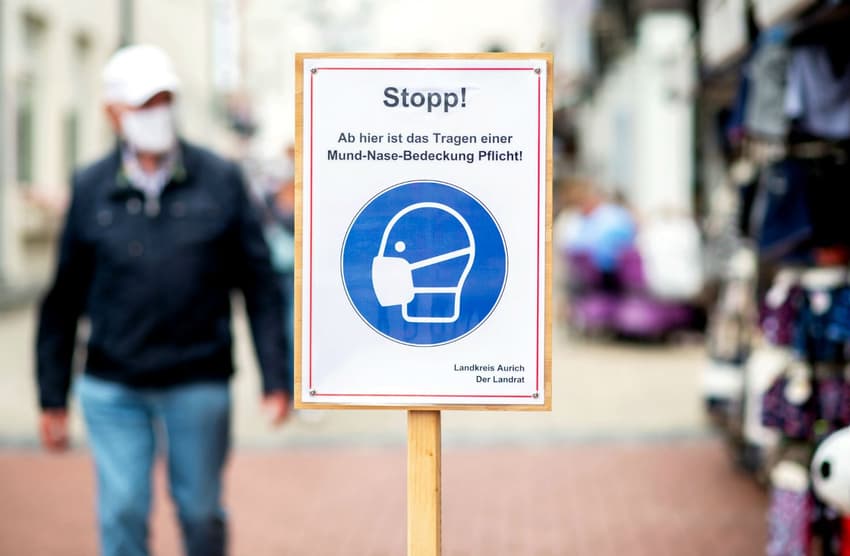Germany reports over 200,000 coronavirus cases since start of pandemic

The number of registered coronavirus infections in Germany since the start of the epidemic has exceeded the 200,000 mark, reported the Robert Koch Institute on Thursday.
Since the beginning of the coronavirus crisis in Germany - when the first cases were reported in Bavaria - at least 200,260 people in Germany have been infected with the Sars-CoV-2 virus, reported the Robert Koch Institute (RKI) on Thursday morning.
According to the RKI, health authorities in Germany have also reported 534 new coronavirus infections within the last day.
A total of 186,400 people have also recovered from the virus, according to RKI estimates.
There have also been 9,078 deaths from the virus in Germany so far - seven of them in the last 24 hours.
Debate on how to stop spread
The newest numbers come amid a debate about how and when Germany should introduce new restrictions to better stem the spread of the virus.
There will be no curfews imposed on entire districts with a high case count, as was discussed earlier in the week between Germany’s 16 states.
READ ALSO: Germany mulls curfews in areas with coronavirus outbreaks
Rather, the country aims to speed up on-site testing in areas where there’s an outbreak, possibly with the help of the Bundeswehr, or German army, Head of the Chancellor’s Office Helge Braun told ZDF television.
In a video conference on Thursday, Braun and state representatives will discuss how to prevent holiday returnees from spreading the virus.
It comes as Germany looks to impose heavier restrictions on holidaymakers in Mallorca after “reckless behaviour” was reported in the popular tourist destination.
The goal is to make any restrictions "faster, smaller and more precise", Braun told ZDF.
New R-value
To measure the severity of the virus, Germany relies largely on the reproductive value, or R-value for short. Authorities have hammered home the importance of keeping the figure below 1.
On Thursday morning, the R-value stood at 1.02, down from 1.06 the previous day.
This means that, on average, one person with the virus infects approximately one other person. The R-value reflects the course of infection from about 1.5 weeks before.
Since the middle of May, the RKI has also indicated a so-called seven-day R. It refers to a longer period and is therefore less subject to daily fluctuations. According to RKI estimates, this value was 0.95, up from the previous day’s 0.91.
READ ALSO: How worried should we be when Germany reports a higher coronavirus infection rate?
Vocabulary
Exceeded - überschritten
Representative - (der) Vertreter
Infect - anstecken
On site - vor Ort
We're aiming to help our readers improve their German by translating vocabulary from some of our news stories. Did you find this article useful? Let us know.
Comments
See Also
Since the beginning of the coronavirus crisis in Germany - when the first cases were reported in Bavaria - at least 200,260 people in Germany have been infected with the Sars-CoV-2 virus, reported the Robert Koch Institute (RKI) on Thursday morning.
According to the RKI, health authorities in Germany have also reported 534 new coronavirus infections within the last day.
A total of 186,400 people have also recovered from the virus, according to RKI estimates.
There have also been 9,078 deaths from the virus in Germany so far - seven of them in the last 24 hours.
Debate on how to stop spread
The newest numbers come amid a debate about how and when Germany should introduce new restrictions to better stem the spread of the virus.
There will be no curfews imposed on entire districts with a high case count, as was discussed earlier in the week between Germany’s 16 states.
READ ALSO: Germany mulls curfews in areas with coronavirus outbreaks
Rather, the country aims to speed up on-site testing in areas where there’s an outbreak, possibly with the help of the Bundeswehr, or German army, Head of the Chancellor’s Office Helge Braun told ZDF television.
In a video conference on Thursday, Braun and state representatives will discuss how to prevent holiday returnees from spreading the virus.
It comes as Germany looks to impose heavier restrictions on holidaymakers in Mallorca after “reckless behaviour” was reported in the popular tourist destination.
The goal is to make any restrictions "faster, smaller and more precise", Braun told ZDF.
New R-value
To measure the severity of the virus, Germany relies largely on the reproductive value, or R-value for short. Authorities have hammered home the importance of keeping the figure below 1.
On Thursday morning, the R-value stood at 1.02, down from 1.06 the previous day.
This means that, on average, one person with the virus infects approximately one other person. The R-value reflects the course of infection from about 1.5 weeks before.
Since the middle of May, the RKI has also indicated a so-called seven-day R. It refers to a longer period and is therefore less subject to daily fluctuations. According to RKI estimates, this value was 0.95, up from the previous day’s 0.91.
READ ALSO: How worried should we be when Germany reports a higher coronavirus infection rate?
Vocabulary
Exceeded - überschritten
Representative - (der) Vertreter
Infect - anstecken
On site - vor Ort
Join the conversation in our comments section below. Share your own views and experience and if you have a question or suggestion for our journalists then email us at [email protected].
Please keep comments civil, constructive and on topic – and make sure to read our terms of use before getting involved.
Please log in here to leave a comment.